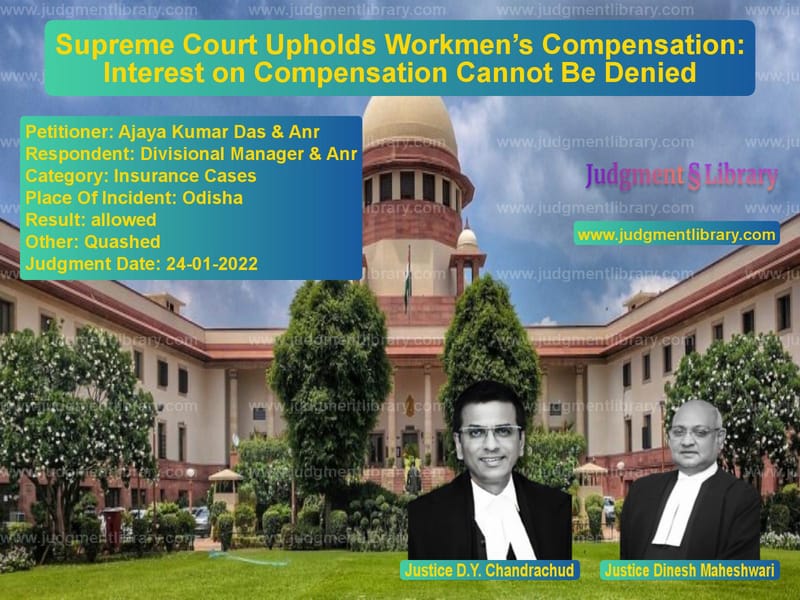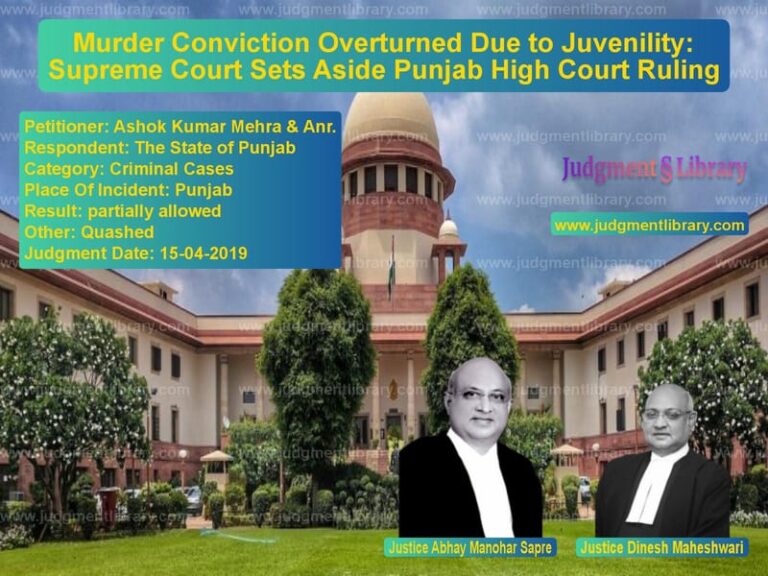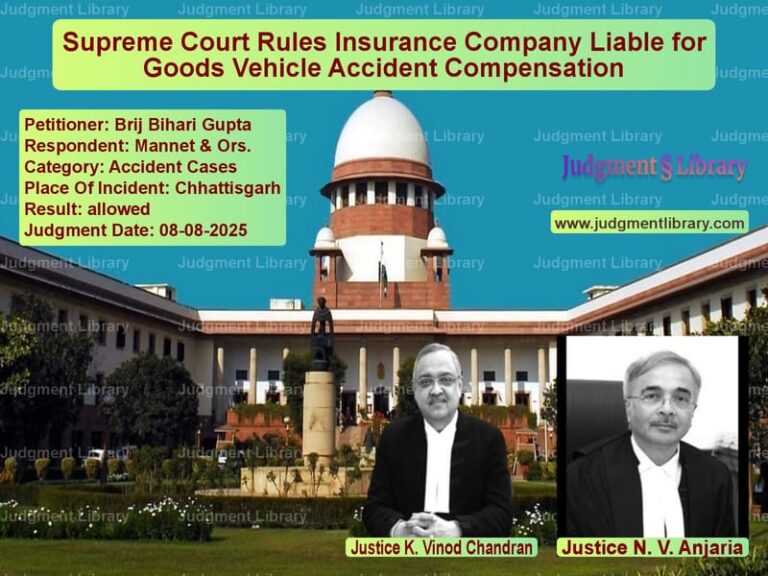Supreme Court Upholds Workmen’s Compensation: Interest on Compensation Cannot Be Denied
The case of Ajaya Kumar Das & Anr vs. Divisional Manager & Anr is a landmark judgment concerning workmen’s rights and their rightful compensation under the Workmen’s Compensation Act, 1923. The dispute arose when the High Court of Orissa, despite dismissing an insurer’s appeal on limitation grounds, erroneously modified the awarded compensation by removing the interest component. The Supreme Court of India was called upon to rectify this miscarriage of justice and ensure that the injured workman received what was lawfully due to him.
This case highlights critical aspects of compensation laws, the responsibility of insurers, and the role of courts in ensuring justice for workmen. Through a detailed examination of the facts, legal arguments, and judicial reasoning, this judgment reinforces the principle that workmen must receive timely compensation with interest, and that procedural fairness must be upheld.
Background of the Case
The first appellant, Ajaya Kumar Das, was working as a labourer engaged in the loading and unloading of sand. He was employed for this work on a truck bearing registration number OAX 2764. On June 5, 2000, the truck met with an accident, causing severe injuries to the appellant. He sustained multiple injuries to his abdomen and kidney and had to undergo surgery. Despite the medical treatment, his injuries resulted in a permanent disability of 85%, which significantly reduced his earning capacity.
Recognizing the severity of his injuries and the impact on his livelihood, the appellant filed a compensation claim before the Workmen Compensation-cum-Assistant Labour Commissioner, Odisha. The Commissioner ruled in his favor and granted compensation based on the prescribed formula under the Workmen’s Compensation Act, 1923. The calculations for his compensation were as follows:
- Monthly income: Rs. 2,100
- Age factor for 22-year-old: 221.37
- Loss of earning capacity: 100%
- Compensation amount: Rs. 2,78,926
Additionally, the Labour Commissioner directed that the compensation must be paid along with interest at a rate of 12% per annum from the date of the accident until the full payment was made.
High Court Proceedings
The first respondent, the insurer, challenged this order before the High Court of Orissa by filing an appeal (FAO No. 358 of 2018). However, there was a significant delay of 619 days in filing the appeal. The High Court, in its order dated April 11, 2018, dismissed the appeal due to the unexplained delay.
Despite rejecting the appeal on limitation grounds, the High Court made an unexpected modification: it removed the interest component from the compensation award. This meant that while the appellant was still entitled to the principal compensation amount, he would not receive the additional 12% interest, which was a crucial part of the relief granted under the law.
The petitioner then sought a review of the High Court’s order, arguing that the removal of interest was legally untenable. However, the High Court dismissed the review petition, stating that the appellant had already withdrawn the awarded amount along with the accrued interest.
Arguments of the Petitioner
The petitioners, representing the injured workman, contended that the High Court had exceeded its jurisdiction by modifying the compensation order after dismissing the insurer’s appeal due to delay. They argued:
“When the appeal was dismissed on the ground of limitation, the High Court could not have entertained it on merits.”
They further cited precedents such as Oriental Insurance Co. Ltd. v. Siby George, which held that compensation and interest must be granted from the date of the accident. The petitioners asserted that the High Court’s ruling deprived the workman of his legally entitled benefits and set a dangerous precedent that could allow insurers to evade liability by exploiting procedural loopholes.
Arguments of the Respondent
Despite being served a notice, the insurer did not appear in the Supreme Court proceedings. However, their primary argument in the High Court was that interest on compensation should not be awarded beyond the accrued interest.
Supreme Court’s Observations
The Supreme Court, led by Justices Dr. D.Y. Chandrachud and Dinesh Maheshwari, made the following key observations:
- The High Court had no jurisdiction to modify the compensation order after dismissing the insurer’s appeal due to limitation.
- Under Section 4A of the Workmen’s Compensation Act, interest is payable from the date of the accident, as reaffirmed in Saberabibi Yakubhai Shaikh v. National Insurance Co. Ltd.
- The insurer had engaged in delaying tactics, leveraging its dominant position to evade rightful compensation.
Final Judgment
The Supreme Court set aside the High Court’s modification and restored the original compensation order, including the 12% interest. Additionally, it imposed a cost of Rs. 50,000 on the insurer for prolonging litigation unjustly.
“A well-resourced insurance company has used its position of dominance to evade the cause of justice. Such strategies must be eschewed.”
Significance of the Judgment
This ruling has several implications:
- Reinforcement of Workers’ Rights: It upholds the principle that workmen are entitled to compensation with interest from the date of the accident, ensuring they receive just compensation for their injuries.
- Limitation on Judicial Overreach: It clarifies that courts cannot modify compensation awards if an appeal is dismissed on limitation grounds.
- Warning to Insurers: The penalty imposed on the insurer serves as a deterrent against using procedural delays to evade liability.
With this decision, the Supreme Court has reinforced its commitment to protecting the rights of injured workmen and ensuring that procedural lapses do not become tools for denying justice.
Petitioner Name: Ajaya Kumar Das & Anr.Respondent Name: Divisional Manager & Anr.Judgment By: Justice D.Y. Chandrachud, Justice Dinesh Maheshwari.Place Of Incident: Odisha.Judgment Date: 24-01-2022.
Don’t miss out on the full details! Download the complete judgment in PDF format below and gain valuable insights instantly!
Download Judgment: ajaya-kumar-das-&-an-vs-divisional-manager-&-supreme-court-of-india-judgment-dated-24-01-2022.pdf
Directly Download Judgment: Directly download this Judgment
See all petitions in Worksite Accidents
See all petitions in Compensation Disputes
See all petitions in Motor Insurance Settlements
See all petitions in Judgment by Dhananjaya Y Chandrachud
See all petitions in Judgment by Dinesh Maheshwari
See all petitions in allowed
See all petitions in Quashed
See all petitions in supreme court of India judgments January 2022
See all petitions in 2022 judgments
See all posts in Insurance Cases Category
See all allowed petitions in Insurance Cases Category
See all Dismissed petitions in Insurance Cases Category
See all partially allowed petitions in Insurance Cases Category







